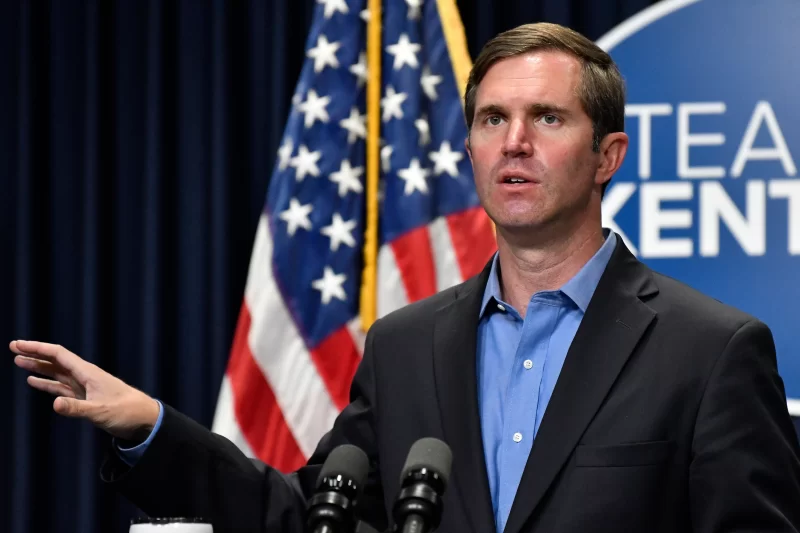Kentucky has become increasingly Republican since 2016, when Donald Trump’s popularity atop the ticket enabled the GOP to win the state House to complete its takeover of the legislature and solidify its power. Trump easily carried Kentucky again in the 2020 presidential election.
Republicans hold both U.S. Senate seats, five of the state’s six congressional districts, supermajorities in the legislature and most statewide constitutional offices. Democrat Andy Beshear hold the governorship. Beshear will seek a second term next year.
Kentucky’s top race this November is Republican U.S. Sen. Rand Paul’s bid for a third term. The libertarian-leaning Paul is being challenged by progressive Black Democrat Charles Booker, a former state legislator. Paul paid little public attention to Booker, refusing to debate his challenger.
Paul capitalized on his massive fundraising advantage to run a series of TV ads, while Booker relied mostly on social media and grassroots campaigning. Democrats haven’t won a Senate election in Kentucky since 1992, when then-incumbent Wendell Ford won his last election.
All five Republican congressmen in Kentucky are in districts seen as safe for the GOP. The lone open seat is in the Democratic-held 3rd District in Louisville. The race pits Democratic state Sen. Morgan McGarvey against Republican businessman Stuart Ray. Louisville is one of the few remaining Democratic strongholds in the state.
The most closely watched contest is a proposed constitutional amendment that would state there’s no constitutional right to abortion in Kentucky. Republican lawmakers have increasingly restricted abortion access since winning full control of the legislature. After years of being on the defensive, abortion-rights groups in Kentucky mounted a strong campaign against the ballot measure.
Republicans are expected to maintain or perhaps expand their supermajorities in the state House and Senate.
Here’s a look at what to expect on election night:
Election Night
The last polls close in Kentucky at 6 p.m. local time (7 p.m. ET). Most of the state is in the Eastern Time Zone and closes at 6 p.m. ET, but 41 counties are in the Central Time Zone and close at 7 p.m. ET.
How Kentucky Votes
Kentuckians overwhelmingly vote at the polls on Election Day. During this year’s spring primary, 83% of Kentucky voters waited until Election Day to cast their ballots.
Kentucky allows three days of no-excuse, early in-person voting on the Thursday, Friday and Saturday before Election Day. In the spring primary, 13% went to the polls during those three days.
The key counties include the state’s most heavily populated areas — Jefferson and Fayette counties. Louisville is in Jefferson County and Lexington is in Fayette County, and both cities vote Democratic. But Republicans have dominated the vast swaths of rural counties elsewhere across the state.
County clerks statewide are able to process absentee ballots — which make up a fraction of the overall vote — ahead of Election Day, but no results are reported until after polls close. Results from a big chunk of the total vote are generally known by 10 p.m. on election night.
Decision Notes
AP will tabulate and declare winners in 67 contested races in Kentucky, including the U.S. Senate, all six U.S. House districts, three state Supreme Court justices, more than 50 legislative races, and the mayors of Louisville and Lexington.
County clerks statewide process absentee ballots — which make up a fraction of the overall vote — ahead of Election Day, but no results are reported until after polls close.
In the 2020 general election, AP first reported results at 6:16 p.m. ET and 90% of results at 9:32 p.m. ET.
The AP may call a statewide or U.S. House race in which the margin between the top two candidates is 0.5% or less, if we determine the lead is too large for a recount to change the outcome.
The AP will not call down-ballot races on election night if the margin between the top two candidates is less than 2% or if the leading candidate is within 2% of the 50% runoff threshold. The AP will revisit those races later in the week to confirm there aren’t enough outstanding votes left to count that could change the outcome.
What Else Should I Know?
Q: What’s Changed Since the Pandemic Election of 2020?
A: Kentucky allows three days of no-excuse, early in-person voting on the Thursday, Friday and Saturday before Election Day. A 2021 state law creates an automatic recount threshold of .5% between winning and losing candidates for nearly all statewide offices, state legislature, and U.S. Senate and House.
Q: What Do Turnout And Advance Vote Look Like?
A: If primary turnout of 19 percent is an indication, turnout will be low. Most Kentuckians vote in person on Election Day. During this year’s primary, 83% of Kentucky voters waited until Election Day to vote. In the spring primary, 13% went to the polls during the three days of no-excuse early voting before Election Day.
Q: How Long Does Counting Usually Take?
A: Kentucky counts most of its vote on Election Day.
Q: What Happens After Tuesday?
A: State law allows for an automatic recount if the difference is .5% between candidates for most state and federal offices, except president. A candidate can request a recanvass of votes, which is not a full recount, if the margin is less than 1 percent. A candidate who requests a re-canvass must seek court approval for a recount.

